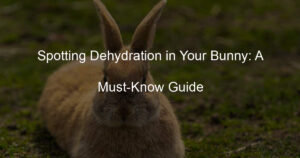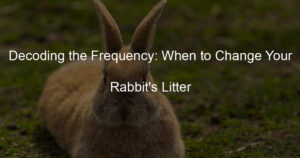
Introduction to Holistic Health in Rabbits
Welcome to our comprehensive guide on holistic health in rabbits. This approach to health care focuses on the whole rabbit, not just treating individual symptoms or diseases. It’s about creating a balance in the rabbit’s body to promote overall well-being.
- Understanding holistic health
- Importance of holistic health in rabbits
Holistic health is a concept that believes in treating the whole individual, not just the symptoms of a disease. It emphasizes the connection of mind, body, and spirit. In the case of rabbits, holistic health involves considering their diet, environment, behavior, and emotional state. It’s about providing a natural, balanced lifestyle that prevents illness and promotes longevity.
Rabbits, like all animals, can benefit greatly from a holistic approach to health. This approach can help prevent common rabbit diseases, reduce stress, and improve their quality of life. For example, a balanced diet can prevent obesity and dental problems, while a stimulating environment can reduce boredom and destructive behavior.
According to a study, rabbits who live in a holistic environment tend to live longer and healthier lives. They are less likely to suffer from common rabbit diseases such as gastrointestinal stasis and dental disease. This shows the importance of holistic health in rabbits.
As we delve deeper into this topic, we will explore various aspects of holistic health in rabbits, including herbal remedies, natural care, and more. Stay tuned to learn how you can provide the best holistic care for your furry friend.
Exploring Herbal Remedies for Rabbits
Herbal remedies are a natural and effective way to support the health of your rabbit. They can help with a range of issues, from digestive problems to skin conditions and respiratory health. Let’s explore some of the most common types of herbal remedies for rabbits.
Types of Herbal Remedies for Rabbits
There are many different types of herbal remedies that can be used to support the health of your rabbit. Here are three key categories:
- Herbs for Digestive Health
- Herbs for Skin Health
- Herbs for Respiratory Health
Rabbits have a sensitive digestive system. Certain herbs, such as chamomile and peppermint, can help soothe an upset stomach and promote healthy digestion. These herbs are often given as a tea or mixed into food.
Herbs like calendula and comfrey are known for their skin-healing properties. They can be used to treat a variety of skin conditions, including cuts, scrapes, and rashes. These herbs can be applied topically as a salve or cream.
Echinacea and elderberry are two herbs that can support respiratory health in rabbits. They can help strengthen the immune system and fight off respiratory infections. These herbs can be given orally as a tincture or mixed into food.
Remember, it’s important to consult with a vet before starting any new herbal remedies for your rabbit. While these herbs are generally safe, they may not be suitable for all rabbits, especially those with certain health conditions or on medication.
Preparing Herbal Remedies
When it comes to holistic health in rabbits, preparing herbal remedies is a crucial part. This process involves three main steps: choosing the right herbs, creating herbal mixtures, and administering these remedies to your rabbits. Let’s delve into each of these steps.
- Choosing the Right Herbs
- Creating Herbal Mixtures
- Administering Herbal Remedies
Choosing the right herbs is the first step in preparing herbal remedies for your rabbit. It’s essential to select herbs that are safe and beneficial for rabbits. Some herbs, like dandelion and plantain, are known for their digestive health benefits. Others, like chamomile and calendula, can help with skin health. Always research or consult with a vet before introducing a new herb to your rabbit’s diet.
Once you’ve selected the right herbs, the next step is to create herbal mixtures. This process involves combining different herbs in the right proportions to maximize their health benefits. For example, a mixture for digestive health might include equal parts of dandelion and plantain. Remember, it’s important to thoroughly mix the herbs to ensure an even distribution of benefits.
Administering herbal remedies to your rabbit is the final step. This can be done in various ways, such as adding the herbal mixture to their food or water, or applying it directly to their skin (for skin health herbs). Always monitor your rabbit’s reaction to the herbal remedy. If you notice any adverse effects, stop the treatment immediately and consult with a vet.
In conclusion, preparing herbal remedies for rabbits involves careful selection of herbs, creating the right mixtures, and administering them in a safe manner. By following these steps, you can help ensure your rabbit’s holistic health and wellbeing.
Natural Rabbit Care
When it comes to caring for our furry friends, it’s vital to consider their natural needs and behaviors. This includes their diet, which plays a significant role in their overall health and well-being. Let’s delve into the natural diet of rabbits and how you can introduce herbs into their meals.
Natural Diet for Rabbits
Rabbits, in their natural habitats, have a diet that consists primarily of grass, hay, and leafy greens. Understanding this is the first step towards providing your pet with a balanced and healthy diet.
- Understanding a rabbit’s natural diet
- Introducing herbs into a rabbit’s diet
Rabbits are herbivores, meaning they eat plants. In the wild, their diet consists mainly of grass and hay, supplemented by leafy greens, fruits, and vegetables. They also need a constant supply of fresh water. This diet is high in fiber, which is essential for their digestive system. It’s important to replicate this diet as closely as possible when caring for a pet rabbit.
Herbs can be a great addition to your rabbit’s diet. They not only provide variety but also have various health benefits. For example, parsley can help with digestion, while basil can act as a stress reliever. Start by introducing small amounts of herbs and monitor your rabbit’s reaction. If they enjoy it and show no adverse effects, you can make it a regular part of their diet. Remember, moderation is key when it comes to feeding herbs to your rabbit.
In conclusion, understanding and replicating a rabbit’s natural diet is key to their health and happiness. By introducing herbs, you can provide additional health benefits and variety to their meals. Always remember to introduce any new food slowly and in moderation, and consult with a vet if you have any concerns.
Natural Environment for Rabbits
Creating a suitable and natural environment for your rabbit is crucial to their overall health and happiness. Here, we will discuss two key aspects: creating a natural living space and the importance of outdoor time.
- Creating a Natural Living Space
- Importance of Outdoor Time
Creating a natural living space for your rabbit can greatly enhance their quality of life. This involves more than just providing a cage. It’s about recreating, as much as possible, the conditions they would experience in the wild. This includes providing plenty of hay for them to burrow and nest in, as well as toys and objects that encourage natural behaviors like digging and chewing.
It’s also important to ensure that their living space is safe. This means removing any harmful substances or objects, and ensuring that they have plenty of room to move around. A cramped living space can lead to stress and health problems.
Spending time outdoors is also crucial for a rabbit’s health and well-being. In the wild, rabbits spend a lot of their time foraging for food and exploring their environment. Providing your rabbit with regular outdoor time can help to replicate these natural behaviors.
Outdoor time also provides your rabbit with exposure to sunlight, which is important for vitamin D production. However, it’s important to ensure that your rabbit is safe and supervised during their outdoor time, as they can be vulnerable to predators and other dangers.
In conclusion, creating a natural environment for your rabbit involves providing a safe and stimulating living space, and ensuring they have regular outdoor time. By doing this, you can help to ensure that your rabbit is happy, healthy, and living as naturally as possible.
Holistic Rabbit Care
When it comes to rabbit care, a holistic approach can be highly beneficial. This involves considering the whole rabbit, including its physical, mental, and emotional health. Let’s explore how to integrate holistic practices into daily care.
Integrating Holistic Practices into Daily Care
Integrating holistic practices into your rabbit’s daily care routine can help maintain its overall health and wellbeing. Here are two key areas to focus on:
- Herbal Grooming Practices
- Mental Health and Enrichment
Herbal grooming is a natural and gentle way to keep your rabbit clean and healthy. This can involve using herbal shampoos and conditioners, which are free from harsh chemicals. For example, chamomile can be used for its calming properties, while lavender can help to repel fleas and ticks. Remember, it’s important to always patch test any new products to ensure your rabbit doesn’t have an adverse reaction.
Mental health is just as important as physical health in rabbits. Enrichment activities can help to keep your rabbit mentally stimulated and prevent boredom. This can include providing toys, creating digging areas, and ensuring they have plenty of space to run and play. Additionally, spending quality time with your rabbit can help to build a strong bond and contribute to their mental wellbeing.
In conclusion, integrating holistic practices into your rabbit’s daily care can contribute to their overall health and happiness. Remember, every rabbit is unique, so it’s important to tailor your care routine to suit their individual needs.
Benefits of Holistic Rabbit Care
When it comes to caring for your pet rabbit, a holistic approach can offer numerous advantages. This method of care focuses on the overall well-being of your rabbit, considering both physical and mental health. Let’s explore the two key benefits of holistic rabbit care.
- Long-term health benefits
- Improved quality of life
One of the most significant advantages of holistic rabbit care is the potential for long-term health benefits. By focusing on natural remedies and preventive care, you can help your rabbit maintain optimal health over its lifetime. For instance, a diet rich in fresh vegetables and hay can prevent obesity and dental problems, which are common issues in domestic rabbits. Similarly, regular exercise and mental stimulation can reduce the risk of stress and boredom, which can lead to destructive behaviors and health issues.
Another important benefit of holistic rabbit care is an improved quality of life. Holistic care encompasses not just physical health, but also the emotional and mental well-being of your rabbit. This includes providing your rabbit with a stimulating environment, plenty of social interaction, and activities that mimic their natural behaviors. By meeting these needs, you can help your rabbit lead a happier and more fulfilling life.
In conclusion, holistic care for rabbits can offer significant benefits for both you and your pet. Not only can it help prevent health issues and extend your rabbit’s lifespan, but it can also improve their overall quality of life. By adopting a holistic approach to rabbit care, you can ensure that your pet is as happy and healthy as possible.
Rabbit Herbal Treatments
Herbal treatments for rabbits have gained popularity due to their natural and gentle approach. Let’s delve into some case studies that demonstrate the effectiveness of these treatments.
Case Studies of Successful Herbal Treatments
Here are two case studies that highlight the successful use of herbal treatments in rabbits.
- Case Study 1: Daisy’s Digestive Issues
- Case Study 2: Max’s Anxiety
Daisy, a three-year-old rabbit, was suffering from frequent digestive issues. Her owner decided to try a herbal approach, introducing chamomile and fennel into Daisy’s diet. These herbs are known for their calming and digestive properties. After a month of this herbal regimen, Daisy’s digestive issues significantly improved. Her energy levels increased, and she was more active and playful than before.
Max, a two-year-old rabbit, was showing signs of anxiety, such as excessive chewing and thumping. His owner introduced lavender, a herb known for its calming effects, into his environment. The lavender was not directly consumed by Max but was placed in his living area. Over time, Max’s anxiety levels decreased, and he became more relaxed and less destructive.
These case studies demonstrate how herbal treatments can effectively address common health issues in rabbits. However, it’s important to remember that every rabbit is unique, and what works for one may not work for another. Always consult with a vet before introducing any new treatments to your rabbit’s routine.
Key Takeaways from Herbal Treatments
When it comes to the health of our beloved rabbits, herbal treatments offer a natural and holistic approach. Here, we will delve into the key takeaways from using these treatments.
- Understanding the Impact of Herbal Treatments
- Learning from Successful Treatments
Herbal treatments have a significant impact on the health and well-being of rabbits. They are derived from nature, making them a safer alternative to synthetic medications. These treatments work by boosting the rabbit’s immune system, aiding digestion, and promoting overall health.
For instance, chamomile is a common herb used in rabbit care. It acts as a mild sedative, helping to calm anxious or stressed rabbits. Dandelion, on the other hand, is rich in vitamins and minerals, supporting the rabbit’s urinary and digestive systems.
There are numerous success stories of rabbits benefiting from herbal treatments. These stories serve as a guide, helping us understand the potential of these natural remedies.
One such example is a rabbit named Daisy. Daisy was suffering from a persistent cough that didn’t respond to traditional medications. Her owner decided to try herbal treatments, specifically, a mixture of thyme and mullein. Within a few weeks, Daisy’s cough had significantly improved. This case demonstrates the potential effectiveness of herbal treatments.
In conclusion, herbal treatments offer a natural, safe, and effective way to care for our rabbits. They not only treat specific health issues but also promote overall well-being. Learning from successful treatments allows us to understand the potential of these remedies and apply them effectively in our rabbit care routine.
Conclusion: Embracing Natural Rabbit Health Care
In this article, we have explored the world of natural rabbit health care. We have delved into the benefits of holistic health and herbal remedies for our furry friends. Now, let’s recap what we’ve learned and look towards the future of rabbit care.
- Recap of holistic health and herbal remedies
Throughout our discussion, we have seen how holistic health approaches can greatly benefit rabbits. This approach focuses on the overall well-being of the rabbit, rather than just treating specific symptoms or diseases. We’ve learned about various herbal remedies that can help maintain a rabbit’s health and treat common ailments. For instance, we’ve discussed how chamomile can soothe a rabbit’s digestive system, and how echinacea can boost their immune system.
These natural remedies are not only effective, but they also align with a rabbit’s natural diet and lifestyle. They provide a gentle, non-invasive way to support a rabbit’s health, without the potential side effects of some conventional treatments.
- Future of rabbit care
Looking ahead, the future of rabbit care is promising. As more and more rabbit owners and veterinarians embrace holistic health and herbal remedies, we can expect to see a shift towards more natural, sustainable, and humane approaches to rabbit care.
Research into herbal remedies for rabbits is also on the rise, which means we can look forward to discovering more effective and safe treatments for our furry friends. In the future, we might even see more specialized herbal blends tailored specifically for rabbits, based on their unique nutritional needs and health challenges.
As rabbit owners, we have a responsibility to provide the best care possible for our pets. By embracing natural rabbit health care, we can ensure our rabbits live long, healthy, and happy lives.




